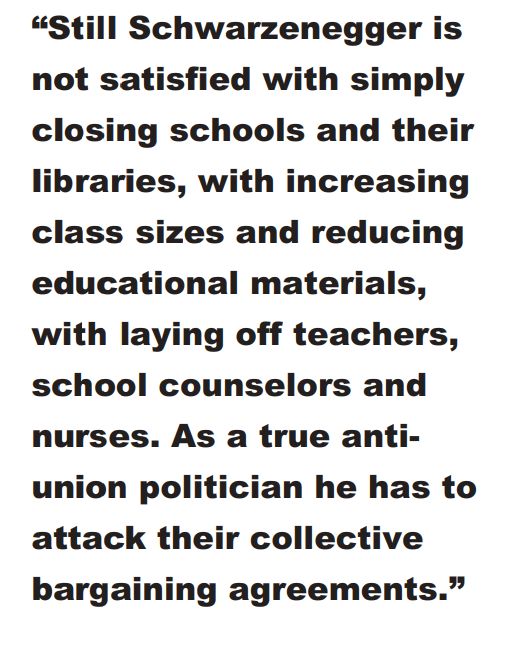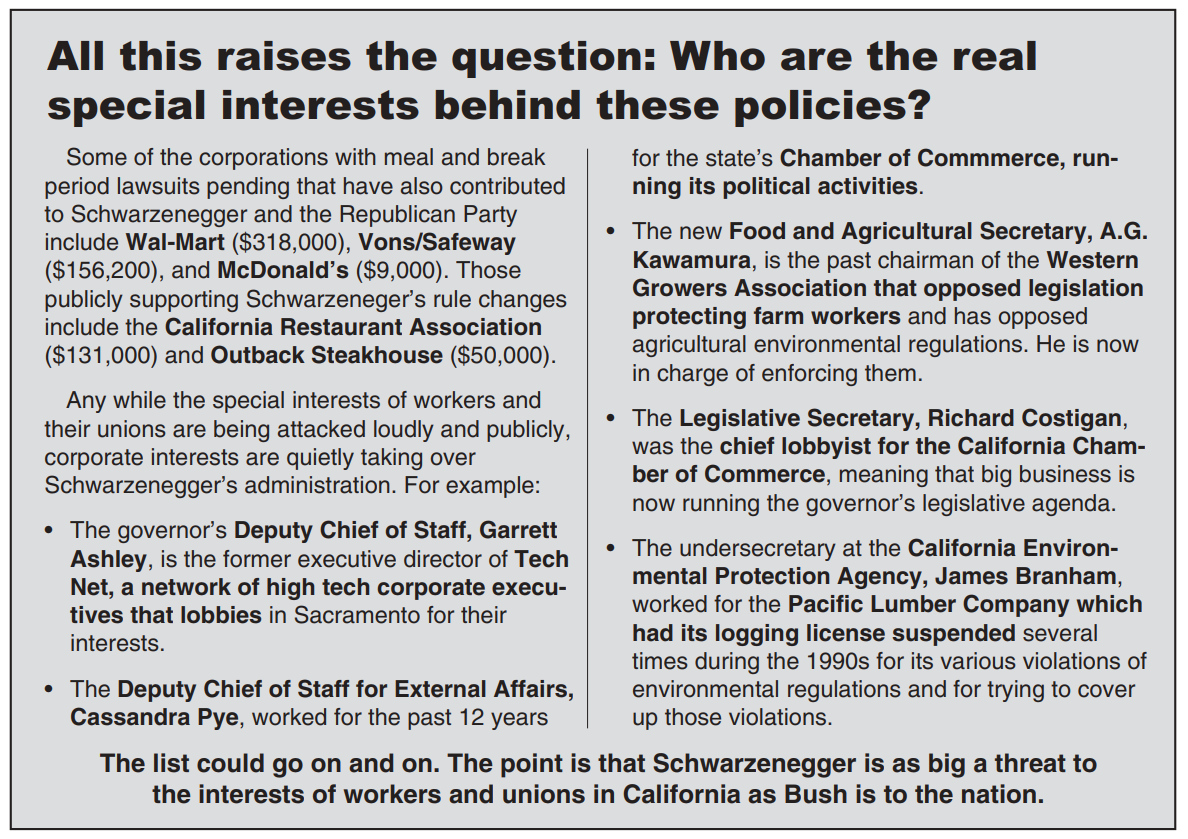Arnold Schwarzenegger rode a wave of populist discontent and Hollywood star power into California’s governorship. He played the role of the outsider taking on the status quo, the new sheriff come to clean up the town. The newspapers never mentioned the bankers and railroad barons funding his efforts.
In a state that rejected George W. Bush by large margins in both 2000 and 2004, Schwarzenegger is pushing an economic agenda that is a clone of Bush’s—attacking union workers, their working conditions and pensions and privatizing as much of the social wealth as possible. He speaks of getting rid of “special interests” to allow the “business of the people” to proceed.Translated, what he really means is getting rid of the protections working people have won through decades of long, hard struggle in California and thereby allowing his rich friends and donors to reap ever-larger profits.
In the short time he as been in office, Schwarzenegger has vetoed legislation that would have raised the minimum wage, that would have reduced offshoring of American jobs, that would have made health care accessible for millions more California workers and that would have reduced prescription drug costs. He has also lowered workers’ compensation payments for disabled workers.
Arnold attacks nurses, teachers, government workers
Many of the “special interests” Schwarzenegger is so boldly taking on have one thing in common—they are workers organized in unions with good contracts affording them livable wages, healthcare coverage and pensions. Among his top targets are nurses, teachers and government workers. Going after the very people who care for our sick family members and who teach our children is particularly perverse.

If you have ever spent any time in the hospital, you know the kind of stress nurses, the front-line care providers, are under with the number of patients they must oversee. And you know who pays the price for their being spread too thin.
The nurses’ unions have pushed for lower patient-to-nurse ratios that mean more care. In fact, the state legislature passed a law, signed by then-Governor Gray Davis, empowering the state’s Department of Health Services to set nursing ratio standards. But at the behest of the health care industry, which apparently can’t seem to make enough money no matter how high or often they raise rates, Schwarzenegger single-handedly stopped the implementation of that law last November. Citing what he claimed was a shortage of nurses, he declared an “emergency” that would allow hospitals to retain the higher ratios. The emergency order expires in 120 days, but Schwarzenegger is trying to extend it for three more years.
Schwarzenegger’s attacks on the state’s teachers are even worse. California voters mandated a certain level of funding for public schools and community colleges by passing Proposition 98 back in 1988. This vote reflected the priority most people give to their children’s education. School officials and teachers’ unions negotiated a cut in the education budget last year to help with the state’s enormous deficit, but did so in exchange for Schwarzenegger’s promise there would be no further cuts. But the governor’s proposed budget reneges on that promise and calls for continuing cuts in school funding.
Still Schwarzenegger is not satisfied with simply closing schools and their libraries, with increasing class sizes and reducing educational materials, with laying off teachers, school counselors and nurses. As a true anti-union politician he has to attack their collective bargaining agreements. He wants to eliminate their good defined benefit pensions and replace them with privatized plans. And it’s not just the teachers he wants to do this to—all government workers, including fire fighters, are now entrenched special interests “threatening our state.”

No “breaks” for workers
Schwarzenegger is even targeting low-wage workers without contracts who depend on the minimal protections offered by state law. His latest move will basically eliminate the legal requirement for employers to give their workers a half hour unpaid lunch break after no more than six hours of work. Under his proposal employers would only be required to post a notice informing workers they have a right to a break, but not be required to provide it or pay workers who miss their breaks. Workers could easily be pressured into “waiving” their meal periods for up to a ten-hour shift.
Schwarzenegger at first tried to enact this change through executive order—that is, just because he said so. He rationalized it as an emergency move to stop all the lawsuits against employers who were violating the meal period law—he was claiming the emergency was not the flagrant illegal actions of the employers, but the enforcement of the law. The public outcry was so intense that even he had to back down temporarily. But he is still intent on getting the state’s Division of Labor Standards Enforcement to change the regulation. ◆

